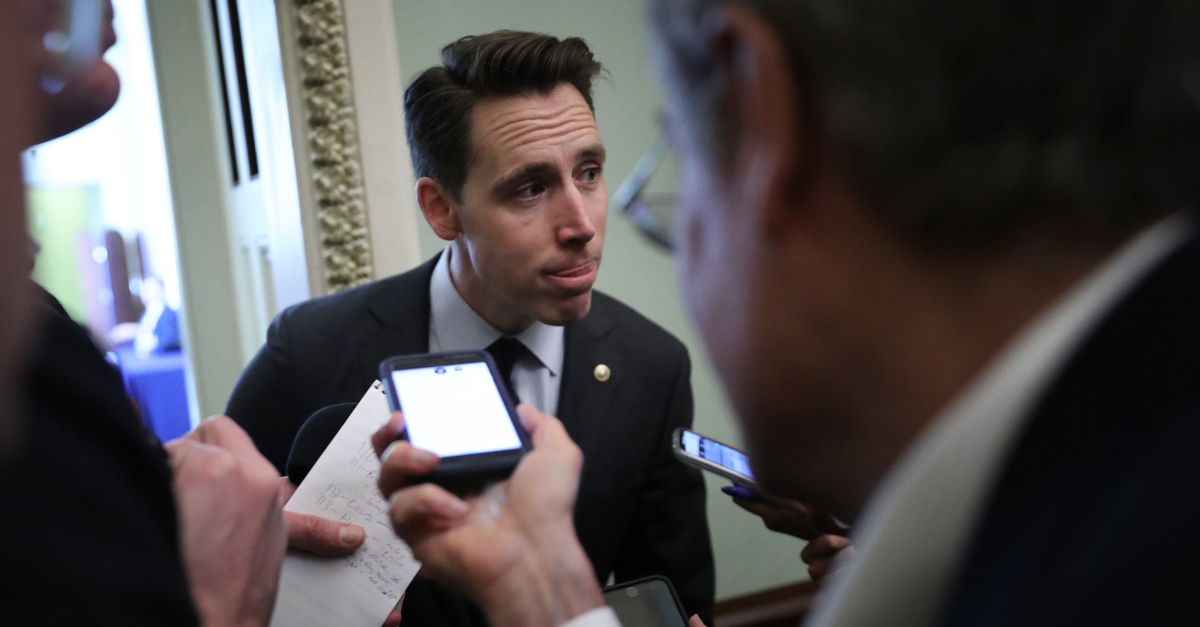
Sen. Josh Hawley (R-Mo.), a senator who described himself in his official biography “as one of the nation’s leading constitutional lawyers,” seems to be struggling these days to understand the document he claims he is an expert at interpreting. In a period of less than 24 hours, Hawley claimed that a publisher’s decision to shut down a book deal was “a direct assault on the First Amendment.” It isn’t. Hours later, he demanded that President-Elect Joe Biden “act like a dignified adult and retract” several “sick comments” which compared Hawley to a Nazi.
Let’s set aside the inherent illogic in Hawley’s assertion that his speech should be published while Joe Biden’s should be cancelled. Instead, let’s focus on the law starting with the complaints about the publisher.
In a late Thursday tweet, Hawley called the people in charge of editorial decisions at the publishing firm Simon & Schuster a “woke mob” for making an “Orwellian” decision to cancel his contract.
“I was representing my constituents, leading a debate the Senate floor on voter integrity, which they have no decided to redefine as sedition,” Hawley said in part. “Let me be clear, this is not just a contract dispute. It’s a direct assault on the First Amendment.”
He went on to decry what he called the “cancel culture” and “approved speech.” Yada, yada, yada.
Inasmuch that Hawley has suggested debate on the legislative floor is both important and protected, he is correct. Legislative debates are legally privileged and protected.
Similarly, the Speech and Debate Clause of the Constitution (Article 1, section 6) says “for any Speech or Debate in either House,” legislators “shall not be questioned in any other Place.” But even that is not without limits, as various cases have pointed out.
But Hawley’s comments didn’t even go that far. They ragged on the publishing firm for an alleged “assault” on the First Amendment. That idea is pathetically laughable and easily debunked by the text of that Amendment itself. Let’s review it:
Congress shall make no law respecting an establishment of religion, or prohibiting the free exercise thereof; or abridging the freedom of speech, or of the press; or the right of the people peaceably to assemble, and to petition the Government for a redress of grievances.
The key language is “Congress shall.” Though that language has been broadened over the years to generally mean that the “government” shall not abridge the rights to speech, press, and religion, it has never been broadened so far as to apply to private conduct.
It’s really that simple.
As a private business, Simon & Schuster is under no legal obligation whatsoever to publish anything. As a matter of First Amendment law, it can shut down any book it wants; it can even close up shop and refuse to print anything ever again. Broadly speaking, the First Amendment is a rule that prevents the government or government actors from preventing speech; it does not apply to businesses or private individuals. (There are exceptions, of course, such as time, place, and manner restrictions which prevent, e.g., protests in the middle of military installations, etc.)
The concept is analogous to the argument of a cake baker in Masterpiece Cakeshop, Ltd. v. Colorado Civil Rights Commission. Hawley loves that decision, by the way.
In Masterpiece Cakeshop, a litigant argued, as the Supreme Court explained, that designing a cake was “a wedding endorsement in his own voice and of his own creation” and thus carried “a significant First Amendment speech component [which] implicates his deep and sincere religious beliefs.” The holding was more narrow, however; the court merely said that the baker deserved “neutral and respectful consideration” and that his beliefs were “compromised” by a state agency bent on “a clear and impermissible hostility toward the sincere religious beliefs that motivated his objection.” Thus, the 7-2 holding (remember: Kagan, Breyer, and Kennedy joined the court’s conservatives) was about the commission, not the baker’s ability to refuse service which included a form of speech, but it is close.
As for the other issue, here’s what Hawley said about Joe Biden on Friday:
“President-elect Biden has just compared me and another Republican Senator to Nazis. You read that correctly. Think about that for a moment. Let it sink in. Because I raised questions in the format prescribed by the laws of the United States about the way elections were conducted in the state of Pennsylvania, just as Democrats did about other states in 2001, 2005, and 2017, he is calling me a Nazi. This is undignified, immature, and intemperate behavior from the President-elect. It is utterly shameful. He should act like a dignified adult and retract these sick comments. And every Democrat member of congress should be asked to disavow these disgusting comments.”
As a matter of First Amendment law, Biden can also say what he wants, subject to the penalties for defamation, incitement to riot, etc., which do not include the foregoing. But Biden can’t force someone to privately publish it. And he didn’t.
[Photo by Chip Somodevilla/Getty Images]